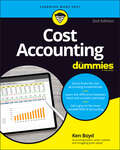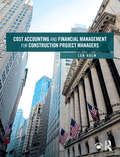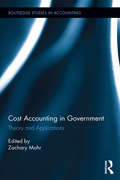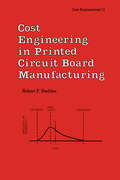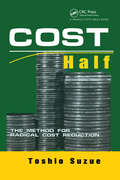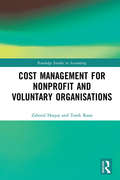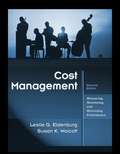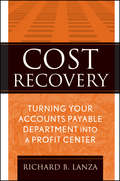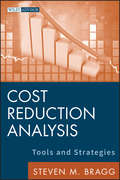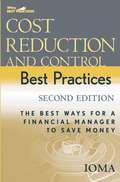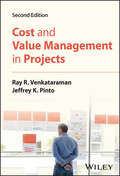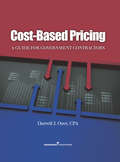- Table View
- List View
Cost Accounting For Dummies
by Kenneth W. BoydTake control of overhead, budgeting, and profitability with cost accounting Cost accounting is one of the most important skills in business, and its popularity as a course in undergraduate and graduate business and management programs speaks to its usefulness. But if you’ve ever felt intimidated by the subject’s jargon or concepts, you can stop worrying. Cost accounting is for everyone! In Cost Accounting For Dummies, you’ll be taken step-by-step through the basic and advanced topics found in a typical cost accounting class, from how to define costs and how to allocate them to products or services. You’ll learn how to determine if a capital expenditure is worth it and how to design a budget model that forecasts changes in costs based on activity levels. Whether you’re a student in your first cost accounting course or a professional trying to get a grip on your books, you’ll benefit from: Simple methods to evaluate business risks and rewards Explanations of how to manage and control costs during periods of business change and pivots Descriptions of how to use cost accounting to price IT projectsCost Accounting For Dummies is the gold standard in getting a firm grasp on the challenging and rewarding world of cost accounting.
Cost Accounting and Financial Management for Construction Project Managers
by Len HolmProper cost accounting and financial management are essential elements of any successful construction job, and therefore make up essential skills for construction project managers and project engineers. Many textbooks on the market focus on the theoretical principles of accounting and finance required for head office staff like the chief financial officer (CFO) of a construction firm. This book's unique practical approach focuses on the activities of the construction management team, including the project manager, superintendent, project engineer, and jobsite cost engineers and cost accountants. In short, this book provides a seamless connection between cost accounting and construction project management from the construction management practitioner’s perspective. Following a complete accounting cycle, from the original estimate through cost controls to financial close-out, the book makes use of one commercial construction project case study throughout. It covers key topics like financial statements, ratios, cost control, earned value, equipment depreciation, cash flow, and pay requests. But unlike other texts, this book also covers additional financial responsibilities such as cost estimates, change orders, and project close-out. Also included are more advanced accounting and financial topics such as supply chain management, activity-based accounting, lean construction techniques, taxes, and the developer’s pro forma. Each chapter contains review questions and applied exercises and the book is supplemented with an eResource with instructor manual, estimates and schedules, further cases and figures from the book. This textbook is ideal for use in all cost accounting and financial management classes on both undergraduate and graduate level construction management or construction engineering programs.
Cost Accounting in Government: Theory and Applications (Routledge Studies in Accounting)
by Zachary MohrManagerial cost accounting is the financial and managerial tool that is used to estimate the organizational cost of products and services in business and government. In recent decades, cost accounting in the United States and other advanced industrial countries has been dominated by discussions of Activity Based Costing or ABC. While ABC can be shown to produce a more accurate estimate of cost than older and more basic types of cost accounting, ABC is not used extensively in many governments. We argue that this recent focus on ABC has stifled examination and discussion of how government cost accounting is being used and how it could be used in practice. The study of cost accounting practice reveals an important and underexplored area of financial management in government. Given the scandals that cost accounting estimates can create and that different types of cost accounting can create different estimates of cost it may be reasonable to ask whether the cost accounting exercise is worth it? Cost Accounting in Government: Theory and Applications addresses these unusual and unusually important topics through a series of studies of different government cost accounting practices. The first section of the book presents two chapters on the history and basic elements of cost accounting. The second section of the book provides further discussion and case studies of actual cost accounting practices in the main areas that cost accounting has been used in government: benchmarking the performance of government services, rate setting, grant overhead cost recovery, and cost management. The last two chapters discuss cost accounting practices in Europe and the future of cost accounting. These cases span local and federal governments and provide a much needed context to the study of cost accounting in government. Aimed at academics, researchers and policy makers in the fields of Accounting, Public Administration, and Government Studies, Cost Accounting in Government: Theory and Applications seeks to address the practical and theoretical gap in government cost accounting research with case studies of different public agencies that are using cost accounting for different purposes. The case studies illustrate that different purposes for cost accounting create unique and interesting cost accounting practices. The case studies provide useful examples of actual cost accounting systems that can inform both research and instruction
Cost Analysis for Engineers and Scientists (Manufacturing and Production Engineering)
by Fariborz TayyariThis book helps apply managerial accounting techniques to problems in areas including that of cost estimation, cost control, product pricing, and business segment discontinuation. It is a valuable resource for short-term courses and seminars conducted to train professionals and practitioners in engineering and manufacturing cost analysis. Cost Analysis for Engineers and Scientists introduces the fundamentals accounting information systems and manufacturing costs. It also presents product costing and manufacturing cost allocation to individual as well as joint products. The concepts and applications of cost-volume-profit and breakeven analysis for single-product and multiple-products are also discussed. It is intended for engineers, managers, and scientists to apply cost analysis techniques for assessing engineering and financial projects. A solutions manual and PowerPoint slides are available for qualified textbook adoption.
Cost Effectiveness in Medical Education
by Kieran WalshWith economic winter facing many healthcare and health education budgets, the high costs of medical education are bringing it under close scrutiny. However, the costs of not providing high quality medical education - not least human costs in morbidity and mortality from medical error - are also high, presenting medical educators, funding managers, policy makers and economists with an unenviable dilemma. To add to their difficulties, remarkably little has been written on cost effectiveness in medical education, including how to calculate costs, how to get maximal value for money and even what constitutes value for money. In this book, the first of its kind, world leading experts comprehensively outline what is known about cost effectiveness in each of their fields. Undergraduate, postgraduate and continuing professional education are all explored, as are e-learning, simulation, cost benefit analysis and numerous other areas. Lecturers and researchers in medical education, clinical tutors and educational supervisors and appraisers, managers responsible for funding medical education and health economists and health policy makers and shapers will find this an invaluable resource. 'An excellent analysis and explanation of an under-explored subject' - from the Foreword by Sir Liam Donaldson.
Cost Engineering Health Check: How Good are Those Numbers?
by Dale Shermon Mark GilmourHigh quality cost estimating gives a business leader confidence to make rational financial decisions. Whether you are a business leader or a cost estimating manager, you have a vested interest in understanding whether you can depend on your organisation's ability to generate accurate cost forecasts and estimates. But how can business leaders have confidence that the cost information that they are being provided with is of high quality? How can a cost estimating manager be sure that their team is providing high quality cost information? QinetiQ's Cost Engineering Health Check is used as a capability benchmarking tool to identify improvement opportunities within their clients' cost estimating capability, enabling them to focus on areas that have the potential to increase their competitiveness. High quality estimating leads to accurate budgets, a reduced potential for cost growth, accurate evaluation of risk exposure, and the opportunity to implement effective earned value management (EVM). The Cost Engineering Health Check employs a standardised competency framework that considers all aspects of cost estimating capability, and provides an objective assessment against both best practice and the industry standard. This framework is based on QinetiQ's long established, tried and tested, Knowledge Based Estimating (KBE) philosophy comprising Data, Tools, People and Process, with additional consideration given to cultural and stakeholder assessments.
Cost Engineering in Printed Circuit Board Manufacturing
by R. P. HeddenThis book is intended as an introduction to printed circuit board manufacturing processes and terminology for readers who have no exposure to them. It provides techniques and approaches to estimating that should prove useful to all who participate in the estimating process.
Cost Estimation
by Gregory K. Mislick Daniel A. NussbaumPresents an accessible approach to the cost estimation tools, concepts, and techniques needed to support analytical and cost decisions Written with an easy-to-understand approach, Cost Estimation: Methods and Tools provides comprehensive coverage of the quantitative techniques needed by professional cost estimators and for those wanting to learn about this vibrant career field. Featuring the underlying mathematical and analytical principles of cost estimation, the book focuses on the tools and methods used to predict the research and development, production, and operating and support costs for successful cost estimation in industrial, business, and manufacturing processes. The book begins with a detailed historical perspective and key terms of the cost estimating field in order to develop the necessary background prior to implementing the presented quantitative methods. The book proceeds to fundamental cost estimation methods utilized in the field of cost estimation, including working with inflation indices, regression analysis, learning curves, analogies, cost factors, and wrap rates. With a step-by-step introduction to the practicality of cost estimation and the available resources for obtaining relevant data, Cost Estimation: Methods and Tools also features: Various cost estimating tools, concepts, and techniques needed to support business decisions Multiple questions at the end of each chapter to help readers obtain a deeper understanding of the discussed methods and techniques An overview of the software used in cost estimation, as well as an introduction to the application of risk and uncertainty analysis A Foreword from Dr. Douglas A. Brook, a professor in the Graduate School of Business and Public Policy at the Naval Postgraduate School, who spent many years working in the Department of Defense acquisition environment Cost Estimation: Methods and Tools is an excellent reference for academics and practitioners in decision science, operations research, operations management, business, and systems and industrial engineering, as well as a useful guide in support of professional cost estimation training and certification courses for practitioners. The book is also appropriate for graduate-level courses in operations research, operations management, engineering economics, and manufacturing and/or production processes.
Cost Half: The Method for Radical Cost Reduction
by Toshio SuzueMaximize Your Profits with Innovative Cost Reduction Techniques!The Cost Half approach does not rely on gradual improvement activities. Rather, it is a radical, "greedy" approach that focuses on developing three interrelated strengths to ensure stable business results. That is, Cost Half puts you on the road to increasing market development strength, improving competitive quality, and maintaining competitive cost. The techniques in Cost Half: The Method for Radical Cost Reduction are designed to help meet target costs and create a sustainable cost management system for strong business capability.Highlights Include: Identification of the telltale signs of a company in need of a Cost Half program Practical techniques for changing cost-generating sources and locations Step by step guide for the implementation of Cost Half in your company Cost Half benchmarking activities A case study demonstrating a successful Cost Half project
Cost Management for Nonprofit and Voluntary Organisations (Routledge Studies in Accounting)
by Zahirul Hoque Tarek RanaIn recent years, nonprofit and voluntary organisations have faced challenges and unanticipated pressures as a result of increased competition for funding, technological advancements, the need to comply with government regulations, and increased social and community expectations regarding greater accountability and transparency. Cost accounting and cost management tools are considered to be a means of providing adequate and quality information for management control for all sorts of organisations, including nonprofits. Using empirical evidence from the Australian nonprofit sector, this research monograph offers insight into how nonprofit and voluntary organisations control and manage the costs of their operations and projects through cost accounting and cost management tools. The book will be of benefit to a range of stakeholders in the sector, including financial and management accountants, professional accounting bodies, the government, policymakers, academics, consultants and operational managers.
Cost Management: Measuring, Monitoring, and Motivating Performance
by Leslie G. Eldenburg Susan K. WolcottThis book is written in response to changes in the global business environment. Unbridled access to information and intense competition has meant that cost accounting has become an increasingly important tool for managers and accountants alike. Most textbooks focus on content knowledge and then expect students to 'magically' demonstrate skills such as decision-making and critical thinking. "Cost Management" better prepares students for professional success by bridging the gaps between Knowledge, Skills and Abilities. Many students fail to recognize the assumptions, limitations, behavioral implications and qualitative factors that influence managerial decision-making. The text focuses on cost accounting methods, techniques and the quality of cost accounting information used for decision-making to deliver a thoroughly modern treatment of cost accounting topics.
Cost Per Action Domination Unique Money "Magnet" CPA Guide
by Brian GravesMake Hundreds Of Dollars/Day and Get That Dream Income Started Right Away! CPA marketing can appear daunting; especially when you’re new or have never had the sort of success you have always dreamt of. There are so many factors that need to be considered; from creating a website or a landing page to bringing visitors to your website to actually getting them to sign up for your CPA offers. It can be overwhelming if you don’t know how to go about it. I know how depressing it can be to open your Paypal only to find it in a sad state….with just a few dollars or nothing at all. I've been there........and wouldn't want anyone to go through that.
Cost Recovery
by Richard B. LanzaCost Recovery: Turning Your Accounts Payable Department into a Profit Center shows how to identify a company's hidden financial assets. It provides tools to assist organizations generate cash recoveries, stop profit leaks, move away from control issues, and work towards process improvements. The book shows how to incorporate profit recovery technology, and how to pair a company with a recovery expert best suited to the company's needs to achieve bottom line results. The book discusses how to utilize free services offered by cost recovery consultants, using of top money-saving proves improvements, and how to create a plan to maximize recovering technology.
Cost Reduction Analysis
by Steven M. BraggDiscover the tools for knowing the costs your company should cut, without impacting its ability to deliver goods and services New from Steve Bragg, this book provides the tools for determining which costs a company should cut, without impacting its ability to deliver goods and services. It explains how to use throughput analysis in order to locate bottleneck operations in a company, which in turn dictates where capital investments should (and should not) be made. Delves into process analysis, to determine where excess resources are being used in a business process Describes the total cost of ownership, showing how a single purchasing decision actually snowballs into a variety of ancillary costs Shows how to create and use a spend management system to reduce procurement costs Shows how just-in-time systems can be used to eliminate inventory costs Cost Reduction Analysis: Tools and Strategies provides examples to show how much cost can potentially be eliminated to avoid drastic action later that can imperil your corporation's direction and future.
Cost Reduction and Control Best Practices
by Institute of Management and AdministrationCost Reduction and Control Best Practices provides financial manages with no-nonsense, balanced, and practical strategies that are being targeted and used nationwide for controlling costs by thousands of companies in areas such as human resources, compensation, benefits, purchasing, outsourcing, use of consultants, taxes, and exports. These best practices are based on the trenches experience, research, proprietary databases, and consultants from the Institute of Management and Administration (IOMA) and other leading experts in their fields.* Provides best practices and techniques for controlling costs within a company* New chapters focus on outsourcing costs, downsizing, consultants' costs, and business tax costs* Provides the latest strategies companies re using to control costs
Cost System Analysis
by Robert S. KaplanDescribes six characteristics of cost systems: standard vs. actual costs; job-order vs. process costing; variable vs. full costs; disaggregate vs. aggregate cost accumulation; and specific vs. average rates for labor and overhead. A rewritten version of an earlier case.
Cost Variance Analysis
by Robert S. Kaplan Susanna GallaniThe Cost Variance Analysis note was written to provide students with fundamental concepts and methods for the analysis of cost variances. This note focuses on the decomposition of cost variances into price, quantity and mix variance components, an approach that allows students to identify the root causes of differences between expected and actual costs.
Cost and Value Management in Projects
by Jeffrey K. Pinto Ray R. VenkataramanCost and Value Management in Projects Project manager's guide to achieving cost efficiency and value optimization—thoroughly updated with new cases, examples, and problem sets The newly revised and updated Second Edition of Cost and Value Management in Projects provides project managers with a thorough understanding of the various dimensions of cost and value in projects, along with the factors that impact them and the managerial approaches for achieving cost efficiency and value optimization. Whereas most cost management books discuss the topic from a tactical perspective, such as through the use of simple budgeting or Earned Value Analysis, this Second Edition addresses cost from a strategic perspective, examining project management decision areas that have the potential to enhance value and providing an integrated framework for managing cost. The Second Edition includes updates to key topic areas such as project benefits realization, updated end-of-chapter exercises such as discussion questions and problem sets, updated case studies, and new spreadsheet analytic techniques and examples. Written by two highly qualified authors with significant experience in the field, Cost and Value Management in Projects includes information on: Value management through value planning, engineering, and analysis from the perspective of projects, and best practices on how to avoid common pitfalls in managing cost and value Organization strategy and project selection, organization structure and culture, project definition (and contracts), and estimating project times and cost Developing project plans and schedules, managing risk, scheduling resources and cost, reducing project duration, leadership, performance measurement, and project closure Attainment of value in complex environmental settings and benefits of effective project management Cost and Value Management in Projects is an essential resource on the subject for stakeholders at all corporate and government levels, including executives measuring performance, middle level corporate managers, project and team managers, engineers, project team members, and business consultants, along with students in related programs of study.
Cost of Capital
by Shannon P. Pratt Roger J. Grabowski Richard BrealeyA one-stop shop for background and current thinking on the development and uses of rates of return on capitalCompletely revised for this highly anticipated fifth edition, Cost of Capital contains expanded materials on estimating the basic building blocks of the cost of equity capital, the risk-free rate, and equity risk premium. There is also discussion of the volatility created by the financial crisis in 2008, the subsequent recession and uncertain recovery, and how those events have fundamentally changed how we need to interpret the inputs to the models we use to develop these estimates.The book includes new case studies providing comprehensive discussion of cost of capital estimates for valuing a business and damages calculations for small and medium-sized businesses, cross-referenced to the chapters covering the theory and data.Addresses equity risk premium and the risk-free rate, including the impact of Federal Reserve actionsExplores how to use Morningstar's Ibbotson and Duff Phelps Risk Premium Report dataDiscusses the global cost of capital estimation, including a new size study of European countriesCost of Capital, Fifth Edition puts an emphasis on practical application. To that end, this updated edition provides readers with exclusive access to a companion website filled with supplementary materials, allowing you to continue to learn in a hands-on fashion long after closing the book.
Cost of Capital Fourth Edition Workbook and Technical Supplement
by Shannon P. Pratt Roger J. GrabowskiPraise for Fourth Edition of Cost of Capital Workbook and Technical Supplement "Pratt and Grabowski went the extra mile to supplement their magnum opus by providing this Workbook and Technical Supplement. As a finance professor for many years, I know from experience that students and teachers really value supplements to textbooks. It allows the teacher to help the student to review and apply what was presented in the text, and the PowerPoints are a great service to teachers in course preparation. The website provides various worksheets that show the inner workings of the models. I enthusiastically recommend the Workbook and Technical Supplement to finance professors and teachers and their students. -Daniel L. McConaughy, PhD, ASA, Professor of Finance, California State University, Northridge, Valuation Services, Crowe Horwath LLP "The Workbook and Technical Supplement provides a detailed tutorial on understanding and executing the theoretical concepts explained in the Fourth Edition. This supplement is three books in one. Part One is a step-by-step tutorial on estimating certain key components of the cost of equity capital. Part Two provides a bridge between the theory and some practical applications, such as estimating the cost of capital for real property. Parts Three and Four allow the readers to test their comprehension of the concepts and identify areas for a review. It is almost as good as having Professors Pratt and Grabowski looking over your shoulder to ensure that one is both comprehending and correctly implementing the complex concepts. . " -Ashok Abbott, PhD, Associate Professor of Finance, College of Business & Economics, West Virginia University "This text provides the most comprehensive coverage of cost of capital issues that I have seen to date. Messrs. Pratt and Grabowski have created a very accessible and lucid treatment of what most would consider an opaque subject. The Fourth Edition is especially important for its new topics as well as expanded coverage of concepts from earlier editions. Of particular interest is the review of the extreme market conditions during the 2008-2009 crisis and the effect that the unprecedented volatility had on traditional cost of capital models. For years, Pratt and Grabowski's research has informed the business valuation curriculum of the American Society of Appraisers. This book will be added to our reading list, and thousands of students worldwide will benefit from the state?of?the?art content of the Fourth Edition and the companion Workbook and Technical Supplement. Furthermore, Cost of Capital, Fourth Edition should be a mandatory part of every valuation practitioner's library. If you buy this book, you can expect it to become well worn and remain on your desk within arm's length until the publication of the Fifth Edition. " -John Barton, ASA, CPA, Chairman, Business Valuation Committee, ASA "Cost of capital is so much more complex than it used to be. With so many additional considerations regarding each variable of the cost of capital formula, this book is a must for anyone that needs to understand or develop a discount rate. Even the most experienced practitioner will benefit from the outstanding work of Pratt and Grabowski. This book has to become part of your library. " -Gary R. Trugman, CPA/ABV, MCBA, ASA, MVS, President, Trugman Valuation Associates, Inc.
Cost of Capital at Ameritrade
by Mark Mitchell Erik StaffordAmeritrade Holding Corp. is planning large marketing and technology investments to improve the company's competitive position in deep-discount brokerage by taking advantage of emerging economies of scale. In order to evaluate whether the strategy would generate sufficient future cash flows to merit the investment, Joe Ricketts, chairman and CEO of Ameritrade, needs an estimate of the project's cost of capital. There is considerable disagreement as to the correct cost of capital estimate. A research analyst pegs the cost of capital at 12%, the CFO of Ameritrade uses 15%, and some members of Ameritrade management believe that the borrowing rate of 9% is the rate by which to discount the future cash flows expected to result from the project. There is also disagreement as to the type of business that Ameritrade is in. Management insists that Ameritrade is a brokerage firm, whereas some research analysts and managers of other online brokerage firms suggest that Ameritrade is a technology/Internet firm. To obtain executable spreadsheets (courseware), please contact our customer service department at custserv@hbsp.harvard.edu.
Cost of Living
by Helen ThompsonBanks keep your money safe and offer an alternative to carrying piles of money around with you all the time. Learn all this and more in Banking Basics.
Cost of Living: Essays
by Emily Maloney“Astute, compassionate and lethally funny. Maloney is an exceptionally alert writer on whom nothing is lost, who sees everything with excruciating clarity.” —Sarah Manguso, The New York Times The searing intimacy of Girl, Interrupted combines with the uncomfortable truths of The Empathy Exams in a collection of essays chronicling one woman’s experiences as both patient and caregiver, giving a unique perspective from both sides of the hospital bed.What does it cost to live? When we fall ill, our lives are itemized on a spreadsheet. A thousand dollars for a broken leg, a few hundred for a nasty cut while cooking dinner. Then there are the greater costs for even greater misfortunes. The car accidents, breast cancers, blood diseases, and dark depressions. When Emily Maloney was nineteen she tried to kill herself. An act that would not only cost a great deal personally, but also financially, sending her down a dark spiral of misdiagnoses, years spent in and out of hospitals and doctor’s offices, and tens of thousands owed in medical debt. To work to pay off this crippling burden, Emily becomes an emergency room technician. Doing the grunt work in a hospital, and taking care of patients at their most vulnerable moments, chronicling these interactions in searingly beautiful, surprising ways. Shocking and often slyly humorous, Cost of Living is a brilliant examination of just what exactly our troubled healthcare system asks us to pay, as well as a look at what goes on behind the scenes at our hospitals and in the minds of caregivers.
Cost-Based Pricing: A Guide for Government Contractors
by Darrell J. Oyer CPAThis master reference is essential if you contract with the government!Correctly pricing your goods or services—and making certain that those prices are in compliance with myriad federal rules and regulations—is essential to doing business with the government…and ensuring your commercial success. Cost-Based Pricing: A Guide for Government Contractors shows you how to appropriately estimate and price for government contracts and defend those estimates in a government contracting and subcontracting environment. This practical book includes coverage of all government pricing rules and regulations as well as pertinent aspects of related laws, such as the Truth in Negotiations Act.The book walks you through every step of the estimating process. From figuring direct labor costs to intra-company transfers to contract modifications, the coverage is extensive yet accessible for even those new to the process. Using Cost-Based Pricing, you will be able to:• Develop more realistic estimates• Enhance your support of those estimates in negotiations• Avoid violations of the Truth in Negotiations Act• Increase your chances of securing a fair and reasonable priceCost-Based Pricing: A Guide for Government Contractors can make the difference between your success—and profitability—and failure in the federal government arena.
